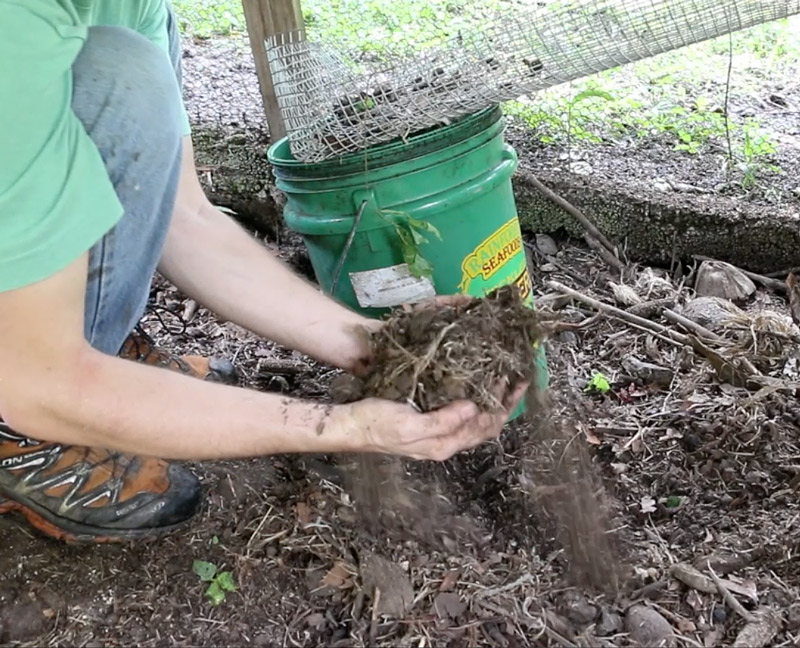I posted this video last year and it has gathered a lot of views and comments since then:
It’s an almost hour-long presentation with a lot of information on easy ways to feed your soil without breaking the bank. And it’s funny. I cover the use of manure, ashes, seaweed and even urine, among other things.
Along the lines of the latter, Polly Jetix left this comment:
“My mother was born in 1925 on the highest elevation farm in PA. The top of Mt Davis. And yes, it was very thin soil. They were quite poor. Moreover, they were very old-fashioned Mennonite. So their lifestyle reflected the 1800’s quite a bit. Mama passed on last year, but she was a marvelous storyteller. She told me how they had an outhouse, of course. But at night, they used the closet at the bottom of the stairs, at the end of the hall. There was a white enamel covered bucket, in that closet. By morning, there was a collection of human waste, which had to be emptied daily. Grandpa always had a deep row plowed open in the garden, from one end to the other. And into this row, that bucket was dumped, and a shovelful or two of soil thrown atop it. Kitchen waste not edible by chickens were also thrown in that trench. That row was allowed to mellow for a year before being used, while the row next to it was being filled. And they never got sick from it. Of course, they knew there were no serious diseases in their waste. It’s not like public human waste collection. Humans have fertilized their gardens for thousands of years with their own waste. In fact, China’s city “night soil” waste was highly prized by local farmers, who paid for it. If you’re leery of the concept, remember that urine is sterile… and high-temperature composting kills just about every pathogen. We’re scared of our own shadows these days.”
Yes! Nature was designed to re-use and recycle, long before we made it trendy. Our modern system is completely out of whack. We’re using clean city drinking water to flush away human waste, when then has to be cleaned out of the system farther down the line. It’s very inefficient. If you want to make a big change in the environment – right now – start composting all your food and paper wastes and get a composting toilet or dig an outhouse.
Right there, you will stop tons of material from entering landfills and water treatment centers, you will save water, and you’ll have lots more material you can feed to your garden instead of buying in fertilizers.
Sure, you can buy a Prius or only shop with reusable cloth bags – but if you’re composting and not using clean water to flush the toilets, you’ll make a much bigger impact. Most of us would rather virtue signal than roll up our sleeves and actually do something.
Compost everything and make a real difference.


4 comments
Indeed. Of course, as with most things, there’s a lot of nuance to be taken into account. So this can go really bad if not done right. That used to be done through long-established traditions. But, of course, in the 20th cent (largely) we were convinced to discard all that old wisdom and do things the “Modern Way!” The arrogance of the last century or so has wreaked much havoc on us.
The typical modern person takes in so much garbage (pharmaceuticals, processed foods with all that entails, etc.) that their waste would probably be net negative (I’m just guessing here). So take that into account. I’m not sure you want the urine of that person taking 5-10 different medicines in your garden. Many other considerations too, I’m sure. All things are not equal to 100 years ago.
Point taken, though from what I’ve read, birth control hormones and pharmaceuticals are also getting in the water supply. Might be better to just have them in backyards.
Yeah, that’s true. Maybe we’re just screwed.
One thought I’ve had is that fungi are supposed to be very good at detoxifying. Maybe there’s a solution there.
Good soil should have plenty of fungal content, of course (enhanced by using wood chips, etc.). So maybe that mitigates the risks somewhat. I have no real good knowledge on this, I’m just spit ballin’ here.
[…] post Do Something That REALLY Helps the Planet! appeared first on The Survival […]
Comments are closed.